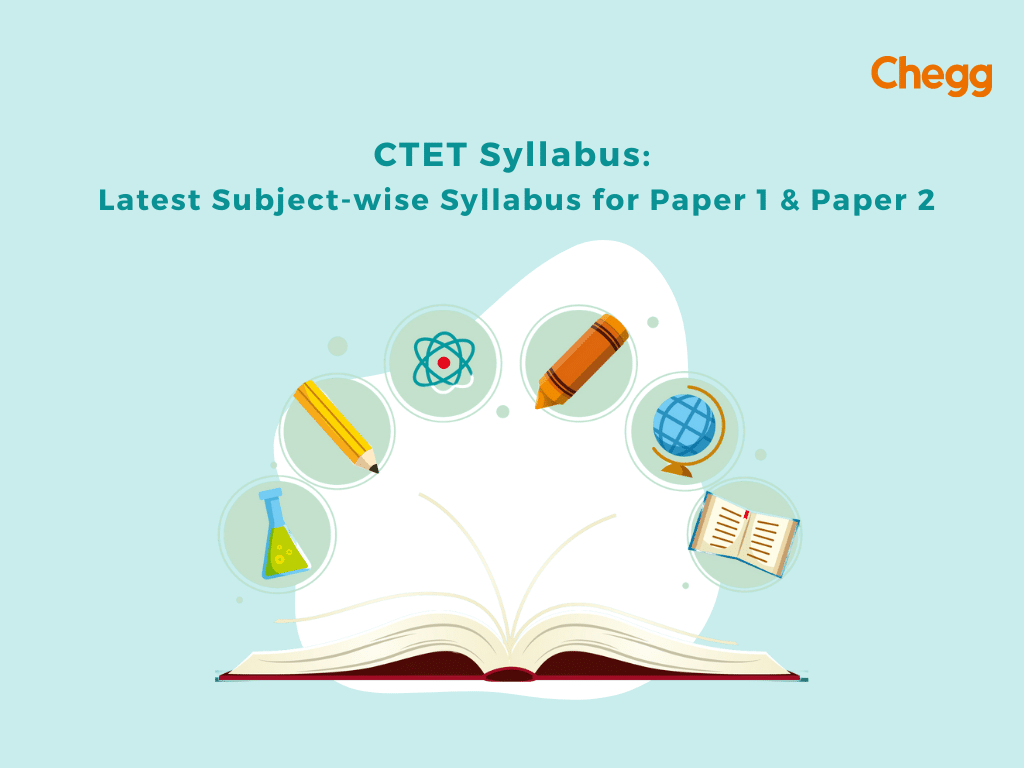
The CTET Syllabus 2025, designed by the Central Board of Secondary Education (CBSE), is intended for aspiring teachers of Classes 1 to 8. It is divided into two papers:
The syllabus includes key subjects such as Child Development and Pedagogy, Language I, Language II, Mathematics, Environmental Studies, and Social Studies, aligning with the objectives of the National Education Policy (NEP) 2020. Understanding the complete syllabus is essential for effective preparation for the CTET 2025 exam.
CBSE conducts the CTET exam twice a year to assess candidates’ eligibility for teaching positions in government schools. The detailed syllabus is published along with the official notification. Reviewing the syllabus early helps candidates focus their study efforts on the right topics.

Access the essential subject content for the CTET syllabus 2025 with our detailed resources for both Paper 1 and Paper 2. Understanding the CTET syllabus 2025 is crucial for effective exam preparation. Our comprehensive materials cover all key topics, including child development, teaching methodologies, and subject-specific content, helping you grasp the important concepts. By following the CTET syllabus 2025 closely, you can create a focused study plan that targets your areas of need. With the right preparation, you’ll build the confidence to tackle the exam successfully.
The syllabus for both papers can be found on the CBSE website. Some of the highlights of the syllabus are as follows:
| Subject | Syllabus |
| Child Development and Pedagogy | Concepts of child-centered and progressive education |
| Language I | Language comprehension, skills, and remedial teaching |
| Language II | Language comprehension, pedagogy of language development |
| Mathematics and Science | Mathematical and scientific concepts, pedagogical issues |
| Environmental Studies | Family and friends, work and play, animals, plants, and pedagogical issues |
| Social Studies/Social Science | History, geography, social and political life, pedagogical issues |
The CBSE conducts the Central Teacher Eligibility Test or CTET examination. The exam is for candidates who wish to become teachers in schools affiliated with the Central government and UTs.
Candidates preparing for the exam need to be familiar with the CTET syllabus 2025 to ensure they are fully ready. Understanding the CTET syllabus 2025 is essential for effective study and helps identify important topics. It covers key areas like child development, teaching methodologies, and subject-specific content, which are crucial for success. By reviewing the CTET syllabus 2025 thoroughly, candidates can create a focused study plan that addresses their strengths and weaknesses. This preparation will boost confidence and improve performance on exam day. To achieve your goals, make sure to explore the CTET syllabus 2025 in detail and use it as a guide throughout your preparation journey.
Here are a few things that the candidates should keep in mind:

Paper 1 of the CTET Syllabus 2025 will be a 2.5-hour exam carrying 150 marks. It will consist of objective-type questions designed to test candidates across multiple subjects. These include Child Development and Pedagogy, along with two compulsory language sections – Language I and Language II. In addition, candidates will face questions from Mathematics and Environmental Studies. To succeed, aspirants must prepare thoroughly for each subject and understand the exam’s structure. A well-planned study strategy, consistent practice, and regular revision of all topics will significantly improve performance and boost confidence in the exam
| Section | Topics | Number of Questions |
| Language I | Comprehension and Pedagogy | 30 |
| Language II | Comprehension and Pedagogy | 30 |
| Mathematics | Geometry, Time, and Volume | 60 |
| Environmental Studies | Food, Shelter, and Water | 30 |
| Child Development and Pedagogy | Principles of child development | 30 |
Find the detailed CTET Paper 1 syllabus: Download PDF here
This section tests the candidates to understand the developmental psychology of children. The questions asked in this section are based on the following topics:
In Language 1 of Paper 1, the questions will be based on the topics of language, literature, and pedagogy. The topics included in Language 1 are:
Language II paper of the CTET exam tests the candidate’s knowledge of language II, which can be either Hindi or English. The paper is divided into two sections, A and B. The sections and sub-topics included in Language II are:
The CTET Mathematics section consists of 30 questions in Paper I. The topics included in the Mathematics section are given below:
Environmental Studies is one of the compulsory subjects in the Central Teachers Eligibility Test (CTET). Environmental Studies aims to create sensitivity towards the environment and its protection. The syllabus is as follows:
The Paper II exam under the CTET Syllabus 2025 is designed for candidates aspiring to teach Classes VI to VIII. It emphasizes the knowledge and teaching skills needed for the elementary level. The paper includes sections on Child Development, Pedagogy, and subject-specific areas aligned with the curriculum. With multiple-choice questions, the exam assesses both conceptual clarity and practical teaching methods. To perform well, candidates must prepare thoroughly across all subjects, practice regularly, and refine their teaching approach. Success in Paper II opens the path to becoming a qualified teacher for upper primary grades, making preparation all the more important.
The CTET Paper II syllabus and various sections, and the number of questions included in Paper 2 are given below:
| Subject | Topic | Number of Questions |
| Child Development and Pedagogy | Child Development and Inclusive Education | 30 questions |
| Language I | Comprehension and pedagogy | 30 questions |
| Language II | Comprehension and pedagogy | 30 questions |
| Mathematics and Science | Mathematical concepts, Scientific concepts, Pedagogical issues | 60 questions |
| Social Studies | History, Geography, Social and Political Life, Pedagogical issues | 60 questions |
Students can find the detailed CTET Paper 2 syllabus: Download PDF here
The CTET Paper 2 syllabus includes Child Development and Pedagogy. It is essential for understanding the behaviour of children. The questions asked in this section are based on the following topics:
The Language 1 section of the CTET Paper 2 has a total of 30 questions. These questions will be based on topics such as language, literature, and pedagogy. Each topic will be allotted a specific number of marks, as follows:
The CTET exam tests your knowledge of Hindi and English. The first section, A, tests your proficiency in the language. Section B tests your teaching skills in the language. The topics included in this section are given below:
The Mathematics and Science section in Paper II is for a total of 60 marks. It tests the candidate’s understanding of mathematical and scientific concepts and their pedagogical aspects. The Mathematics and Science syllabus for Paper II is given below:
The social studies section of the CTET will test the candidates’ social awareness. The social studies section will have 60 questions around the following topics:
Some key points to remember about the CTET syllabus 2025:
Aspirants planning to apply for the 2025 CTET exam should start by carefully reviewing the CTET Syllabus 2025. The exam has two papers: Paper I for primary-stage teachers and Paper II for elementary-stage teachers. Candidates who wish to teach at both levels need to appear for both papers. The syllabus covers essential subjects such as Child Development and Pedagogy, Language I, Language II, Mathematics and Science, Environmental Studies, and Social Studies/Social Science. A clear understanding of these topics is key to effective preparation and better exam performance.
Knowing the complete CTET Syllabus 2025 helps candidates strengthen their subject knowledge and identify weaker areas that require extra attention. This preparation not only boosts confidence but also increases the chances of securing a teaching position in centrally managed government schools. To support your preparation, we’ve compiled the top 15 CTET books that comprehensively cover each subject. These resources offer in-depth insights and practice, enabling candidates to master important concepts and approach the exam with a solid study plan.
Recommended Read:
Ans. The exam covers various subjects essential for teaching, including Child Development and Pedagogy, Language I, Language II, Mathematics and Science, Environmental Studies, and Social Studies/Social Science. Familiarizing yourself with the complete content will help you understand what to expect. By reviewing the topics outlined in the syllabus, you can create an effective study plan that targets each area, ensuring you’re well-prepared for the exam.
Ans. Paper 1 is for candidates who wish to be eligible for teaching classes I to V. Paper II is for candidates who want to qualify for teaching classes VI to VIII.
Ans. CTET passing marks are different for each category. Candidates belonging to the General Category must score 60% marks, whereas candidates from SC/ST/OBC need to achieve 55% marks to pass CTET.
Ans. The best subject for CTET is whichever subject you are most proficient in. However, we recommend choosing a subject from the CTET syllabus that is related to the elementary teaching field, such as science or math.
Ans. Candidates who are appearing for the CTET exam must have completed their B.Ed. from a recognized university to be eligible for the exam.

Authored by, Nidhi Kukreja
Exam Prep Advisor
Nidhi is a passionate writer who specializes in long-form, research-backed content that delivers real value. Whether she’s writing blog articles or creating educational modules, she focuses on making complex topics clear, detailed, and easy to understand. Her content is designed to build knowledge and credibility, helping readers gain deeper insights with every piece.
Editor's Recommendations
Chegg India does not ask for money to offer any opportunity with the company. We request you to be vigilant before sharing your personal and financial information with any third party. Beware of fraudulent activities claiming affiliation with our company and promising monetary rewards or benefits. Chegg India shall not be responsible for any losses resulting from such activities.
Chegg India does not ask for money to offer any opportunity with the company. We request you to be vigilant before sharing your personal and financial information with any third party. Beware of fraudulent activities claiming affiliation with our company and promising monetary rewards or benefits. Chegg India shall not be responsible for any losses resulting from such activities.